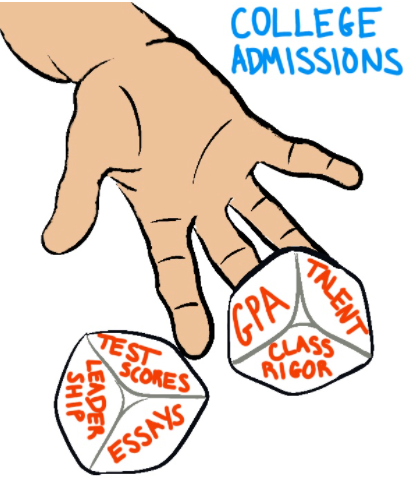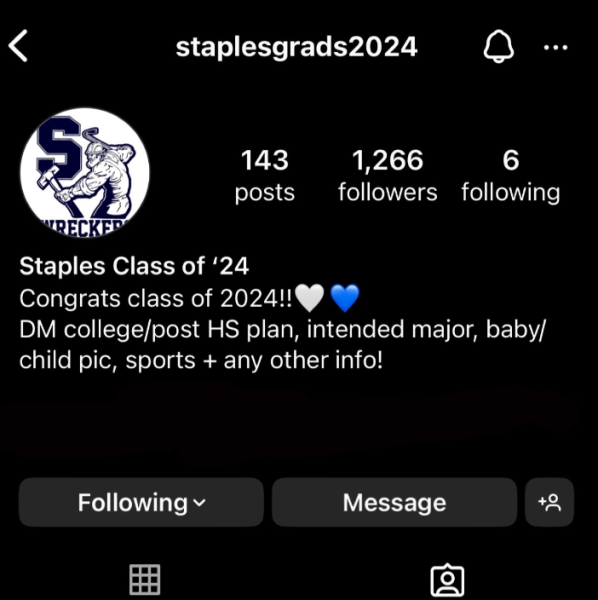College admissions revealed to be incredibly subjective, random

Whether it’s the acceptance rates that are unrepresentative of what happens to Staples students, rampant grade inflation or the wildly different student profiles of each school, the college admissions process is impossible to fully control or predict.
For a few weeks in February, I bided my time waiting for college decisions by analyzing the Naviance scattergrams, binging college decision reaction videos and looking up the rankings and acceptance rates of various colleges other people were attending.
Writing that down now, I recognize how crazy it was. But, I know there are others out there like me with college flooding their minds constantly.
If you’re going to obsess about it, you should take a few key factors into perspective first. The college process is ridiculously subjective and even, at times, random because of the fact that acceptance rates and GPA by themselves mean nothing, colleges take a lavish amount of factors into account and each school, no matter how similar in prestige or rank, is looking for a different, very specific type of student.
To start off, the acceptance rates you see when you google a college are utterly meaningless. According to Naviance, Tulane accepted 37% of applicants from Staples in 2020 whereas their general acceptance rate that year was a dreary 11%. Furthermore, MIT’s acceptance rate is 6% but not a single soul has been accepted from Staples for the last three years. The same goes for UNC Chapel Hill; a school with an acceptance rate of 25% that only admits students with a 4.2+ GPA from Staples. In short, a school’s acceptance rate says very little about your chances.
Every school has a different type of student profile, so getting into school A with the same prestige or quality as school B doesn’t mean you will or should get into school B. The process is incredibly subjective and a bit random.
— Giselle Oldani ’22
When every person in those college decision videos I clicked on had way over a 4.0 GPA, I felt crushed. I thought I was above average, but it seemed like everyone was getting A’s left and right. I’m just not as smart as them, right? No, not necessarily. Grade inflation is rampant across US highschools, especially prep schools. According to the Higher Education Institute at UCLA, 5.7% of freshmen 50 years ago reported receiving an A or A+ as their average grade in highschool. Now, 30.9% report that as their average grade. The real kicker comes when you realize that despite these increased grades, standardized test scores are falling. On Advanced Placement exams, the average score of 3.03 in 1997 dropped to 2.91 in 2020. The discrepancy between the two reveals just how inconsistent and unreliable grades are and just how much they are at the discretion of teachers and principals.
Additionally, a highschool in Houston, Texas had nine valedictorians in 2021, all with a GPA of 5.0. It is not even possible to get a 5.0 at Staples and it’s not so easy that nine students could do it. The standards at highschools across the country are incredibly different, so comparing your GPA to someone else’s GPA from Missouri is just mindless.
College admissions are also based on leadership, volunteerism, test scores, extracurriculars, interviews, essays and connections (special emphasis on that last one). Each school across the country prioritizes these factors independently and differently. Each school releases a common data set every year where they rank how important certain factors like class rigor, talent/ability and volunteer work are. Wake Forest University ranks “Character/personal qualities” as “Very Important” whereas USC and UCLA only rank it as “Important.” The University of Michigan ranks “Extracurricular activities” as just “Considered” while NYU and Notre Dame rank it as “Important.” Every school has a different type of student profile, so getting into school A with the same prestige or quality as school B doesn’t mean you will or should get into school B. The process is incredibly subjective and a bit random.
I obsessed over acceptance rates, rankings, scattergrams and GPA’s because I wanted to feel in control of the admissions process. I wanted to feel like I knew what would happen. But I didn’t. And I still don’t. The admissions process is a beast and there’s no point in trying to predict it or direct it. You can only do so much. Take a look at me: I got into UT Austin and Northeastern but deferred from the University of Georgia. The whole thing is crazy. Accept it and embrace it.

Journalism has always been a passion for Web Managing Editor Giselle Oldani ’22. To her, Inklings is an opportunity to do good in the world.
“There’s...



















































Gene • Apr 6, 2022 at 11:30 am
As a parent and former admissions officer at a Tier 1 (top 25 institution), I feel compelled to respond.
First. GPA and class selection are 92% of the cutoff for 2nd level review. If you make that, you are competing with the 8% left. If you are not taking the top classes your school has to offer, you are already 1 step down. You need 3.86 with top classes to be considered.
4.2, 4.5, 5.0 means nothing. We normalize everything to 4.0. If you have a 4.2 and your school goes to 4.5, we normalize to 3.7333 (4.2/4.5*4). If you school goes to 5, your 4.2 is a 3.36 and you are discounted immediately.
Assuming you are talking Staples in Conn….your high school is not ranked within the top 25, so you will not get an extra bump. Realistically, we rarely care about the quality of schools as long as its in top 75% We review lower on case by case basis.
SAT are a contributing indicator, but not that much.
Extra curricular. Unless you have a unique skill set (that will make money), you are not that special. Everyone at our school had that. Class president, baseball captain, support a kid in Nigeria, we don’t really put stock in that, unless we can verify.
College vines is fairly accurate. If you put your grades scores and profile in, you will get a list of targets, reaches, etc. If you change 1 aspect of your profile (Sex, minority, military) you will see what makes the biggest difference in acceptance.